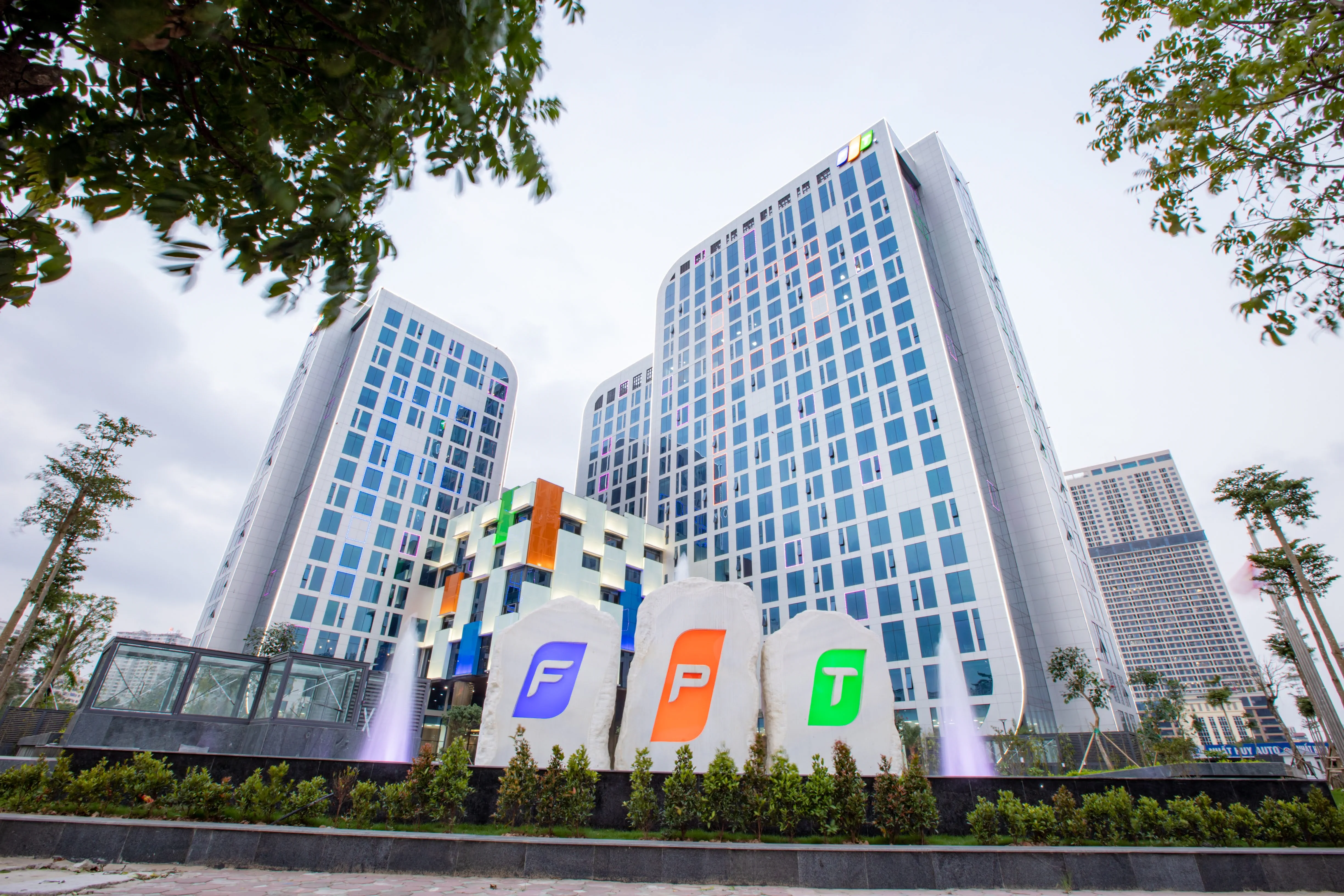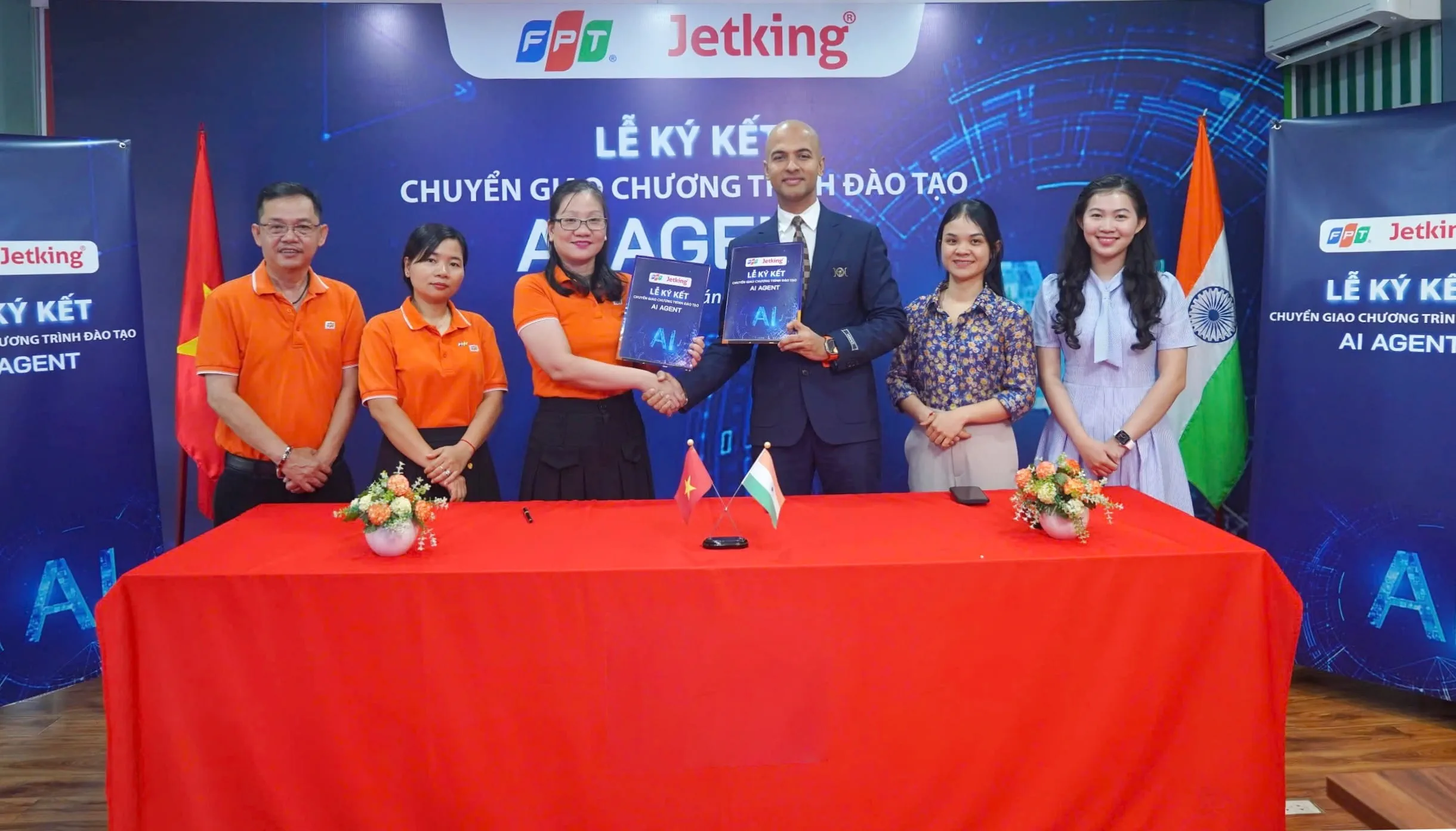Seminar on Semiconductor Workforce Development in Vietnam and Worldwide through Education–Enterprise Collaboration
•
19/04/2025
Hanoi, April 19, 2025 – The seminar “Developing Semiconductor Workforce in Vietnam and Worldwide through Education–Enterprise Collaboration,” organized by Asia University Vietnam (under the FPT International Education Institute, FPT Corporation), attracted representatives from government agencies, businesses, and experts from Vietnam and Taiwan (China), along with numerous parents and students interested in the semiconductor technology field. The event marked an important milestone in promoting high-quality human resource development for one of the key sectors of the technological era.
Opening Session: Vietnam Ready to Enter the High-Tech Era with a Strategic Vision for Semiconductor and AI Workforce Training
At the opening session, speakers emphasized the pivotal role of two core technologies – semiconductors and artificial intelligence – in global development. Vietnam is standing at a significant opportunity to participate deeply in the technology value chain, thanks to its human resource advantages and strong policy support. The event also marked the official launch of Asia University Vietnam – an international program in Business and Technology Education of Asia University, Taiwan (China), in collaboration with FPT University and FPT Corporation.
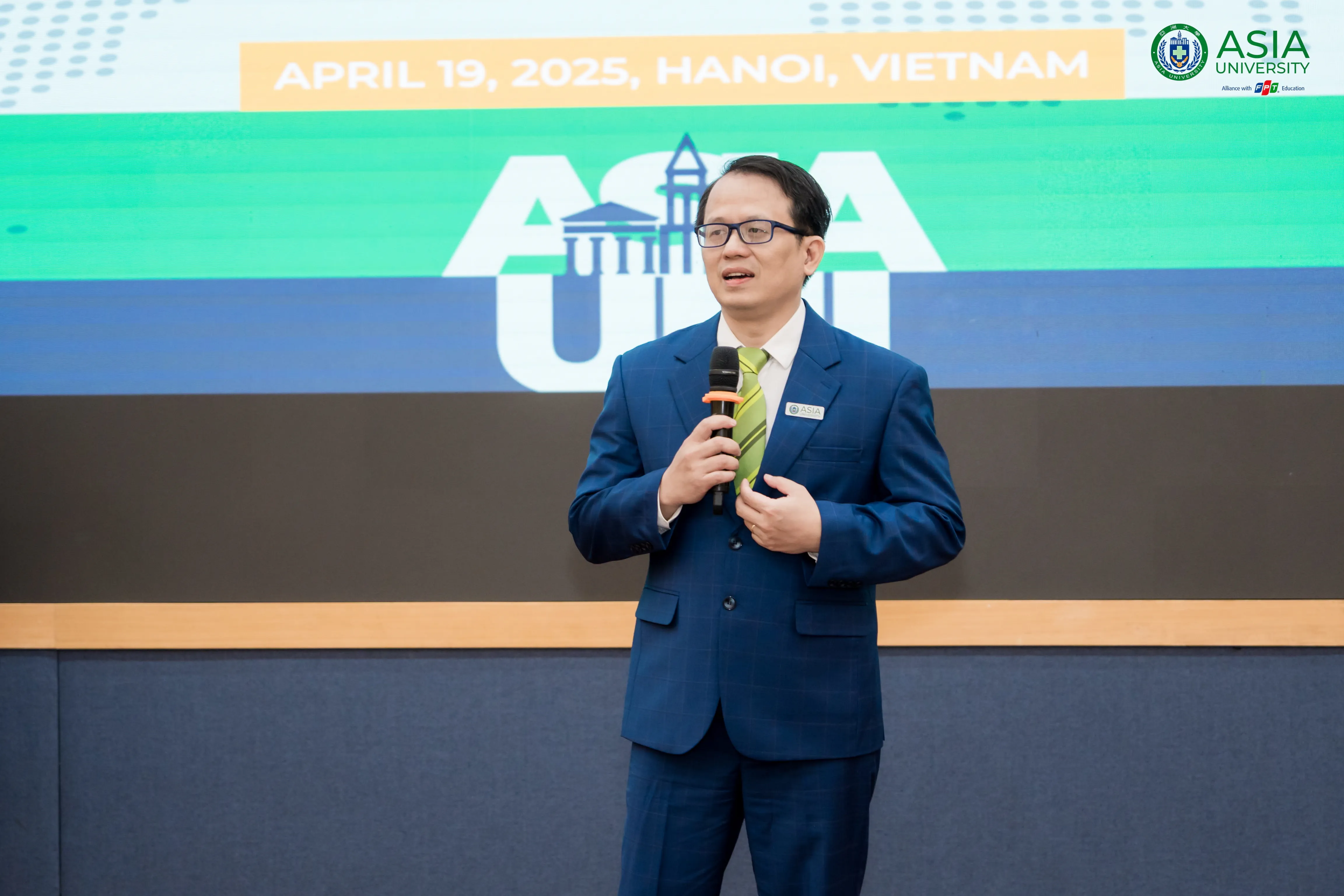
According to Dr. Hoang Viet Ha, representative of FPT, semiconductors and artificial intelligence (AI) are shaping the future, and Vietnam has a great opportunity to integrate into the global value chain.
Dr. Hoang Viet Ha, Director of the FPT International Education Institute, FPT Corporation, highlighted that the two core technologies shaping the future of humanity are Semiconductors and Artificial Intelligence (AI). He stated that Vietnam has strong potential to participate deeply in the global value chain, supported by its young, innovative workforce and the increasing presence of major corporations. Within the event framework, he also officially announced the establishment of Asia University Vietnam – an international program in Business and Technology Education of Asia University, Taiwan (China), in collaboration with FPT University and FPT Corporation.
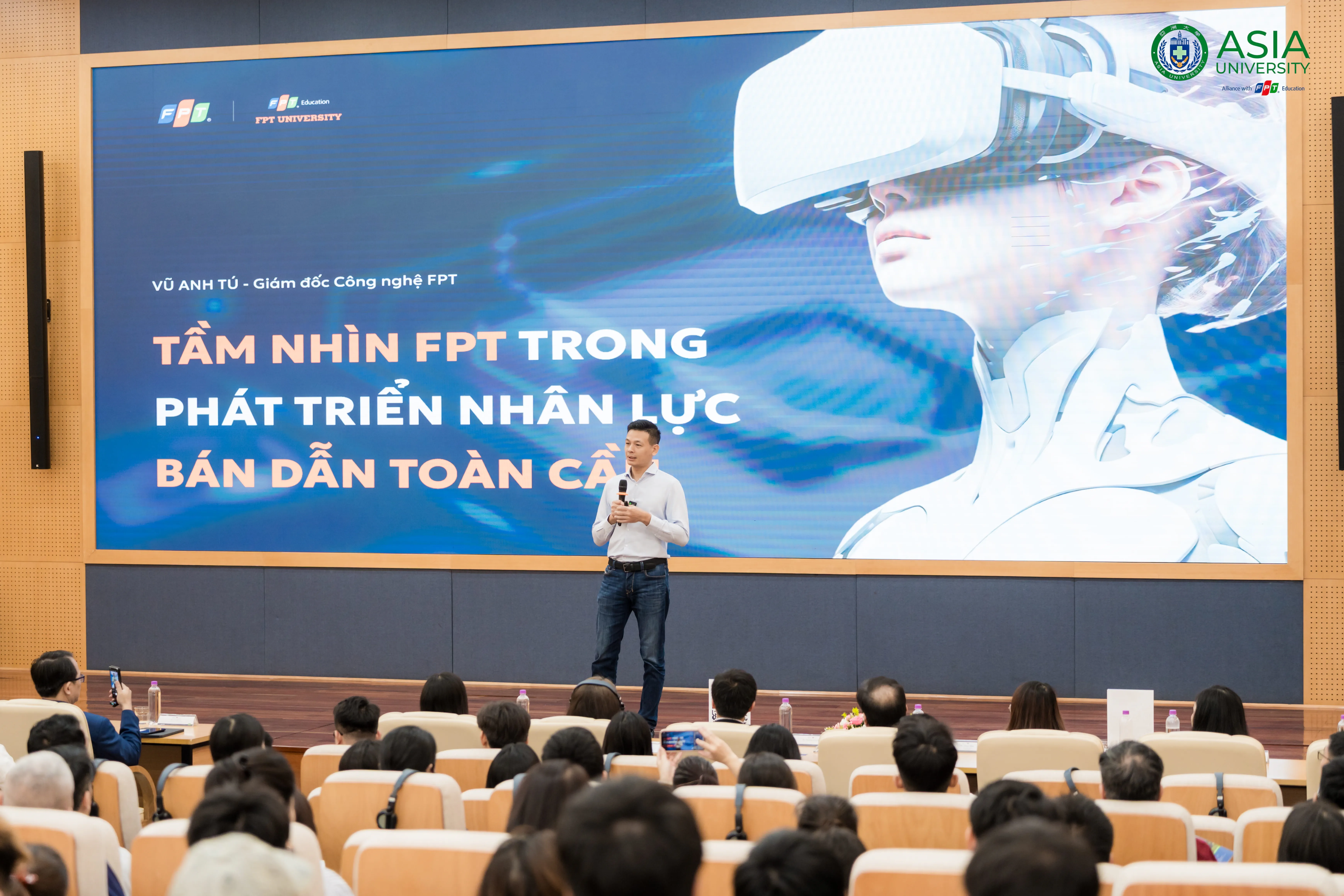
According to Mr. Vu Anh Tu, representative of FPT, the greatest challenge for Vietnam to integrate deeply into the global semiconductor revolution lies in the shortage of high-quality human resources.
Mr. Vu Anh Tu, Chief Technology Officer of FPT Corporation, emphasized that Vietnam is facing a major opportunity in the global semiconductor revolution, yet the most critical challenge is the lack of skilled human resources. As the global semiconductor industry is projected to reach a value of USD 1 trillion by 2030, Vietnam will need to train 50,000–100,000 engineers to meet development demands. He shared FPT’s vision to build a complete semiconductor ecosystem, from design to R&D. Recently, FPT inaugurated an R&D center in Da Nang – aiming to become the “Silicon Bay” of the region. The corporation is accelerating training efforts through partnerships with over 20 universities worldwide. He affirmed: “The collaboration between FPT University, FPT Corporation, and Asia University Taiwan (China) represents a strategic move to develop a high-quality semiconductor workforce toward global goals.”
Mr. Do Tien Thinh, Deputy Director of the National Innovation Center, stated that Vietnam is playing an increasingly important role in the global semiconductor supply chain. The government has issued two strategic decisions to foster the development of the semiconductor industry and the training of high-quality human resources. He emphasized that this is a “golden time” for students to pursue careers in semiconductors. Attractive salaries and sustainable career prospects are creating significant opportunities for young people. Concluding his speech, he conveyed a message: “Go abroad to come back” – encouraging students to gain international experience and contribute to building Vietnam’s high-tech industry.
Prof. Deng Wen Ling, Science and Technology Counselor at the Taipei Economic and Cultural Office, shared Taiwan’s experience as a country that produces 80–90% of the world’s chips. The university–enterprise collaboration model in Taiwan (China) serves as a practical reference for Vietnam to learn from and access core technologies.
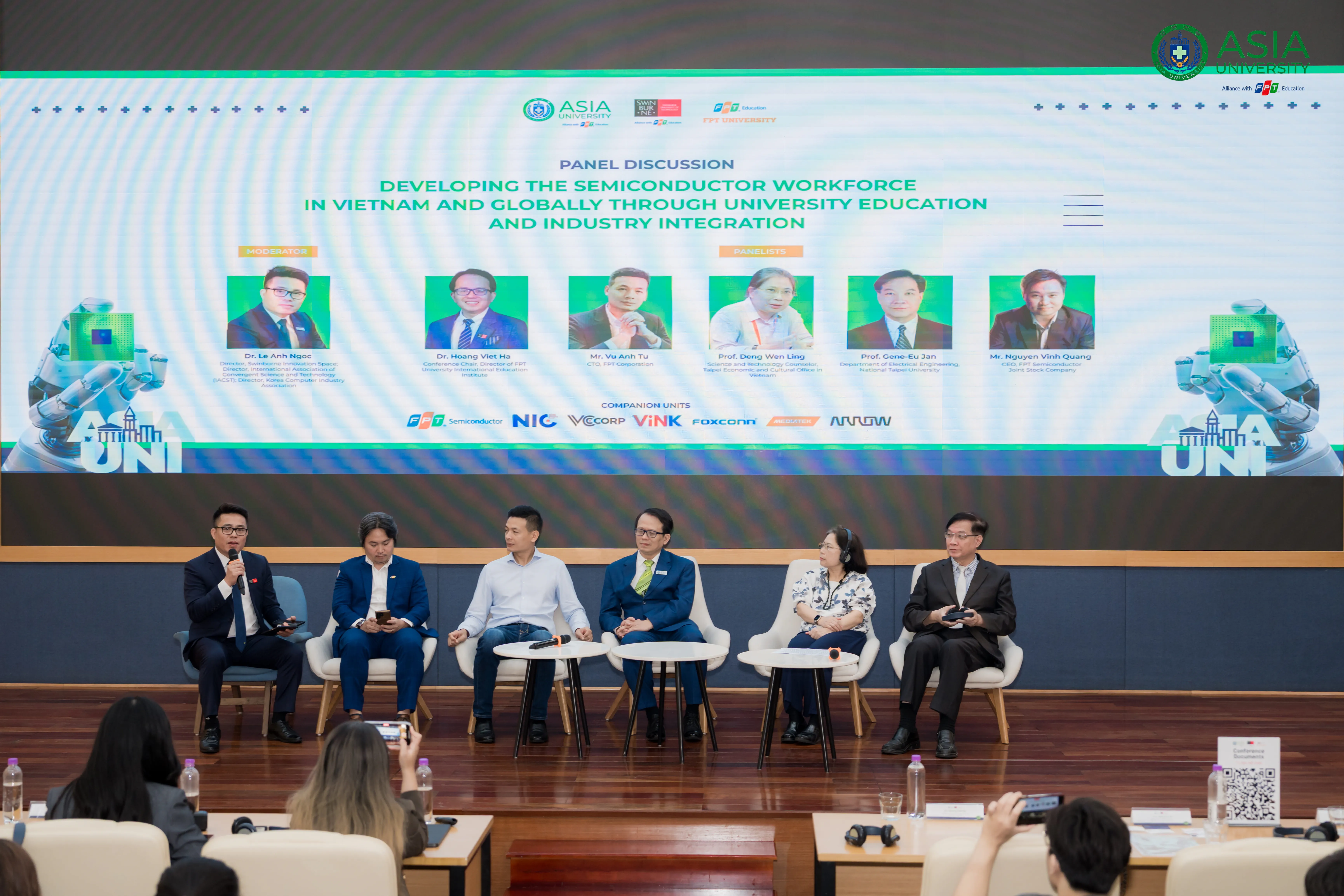
Panel Discussion: Developing Semiconductor Workforce through Education–Enterprise Collaboration
The panel gathered leading experts from Vietnam and abroad in the semiconductor industry.
The panel discussion, featuring representatives from FPT, Asia University, and international experts, underscored the crucial role of collaboration among universities, enterprises, and the government in semiconductor workforce development. Speakers agreed that Vietnam needs more practical training programs connected to major technology centers such as Taiwan (China), the U.S., and South Korea to close the gap with developed nations.
Mr. Vu Anh Tu, Chief Technology Officer of FPT Corporation, emphasized that semiconductors are a foundational technology central to all modern devices. He stressed that mastering semiconductor technology is essential for Vietnam to take control of its technological future, urging students to pursue strategic fields such as microchips, automation, and semiconductor materials. He also highlighted the importance of practical training models aligned with business demands to bridge the gap between academia and the labor market.
Prof. Deng Wen Ling, Science and Technology Counselor at the Taipei Economic and Cultural Office in Vietnam, noted that the government of Taiwan (China) strongly prioritizes the semiconductor industry through international scholarships and cooperation programs. She emphasized that despite its complexity, the industry holds immense potential and offers opportunities across technical, financial, and business domains.
Prof. Gene-Eu Jan from Taiwan (China) stated that Asia University is among Taiwan’s leading institutions in semiconductor engineering education, with the advantage of proximity to major technology corporations such as TSMC. Students gain hands-on experience during their studies, with post-graduation incomes reaching up to USD 100,000 per year demonstrating the value of high-quality human resources.
Mr. Nguyen Vinh Quang, CEO of FPT Semiconductor, FPT Corporation, shared that many Vietnamese graduates still require retraining due to insufficient specialization in semiconductors. He affirmed that linked training programs with Taiwan (China) are a strategic pathway for Vietnam to access advanced technology and teaching methods, thereby enhancing its global competitiveness in the semiconductor industry.
Asia University Vietnam: Opening the Gateway for Vietnamese Students to Access Global High-Tech Education
At the event, experts from Vietnam and Taiwan (China) also provided valuable information on scholarships and international education programs jointly developed by Asia University, Taiwan (China), and FPT University, FPT Corporation creating global learning, internship, and career opportunities for the next generation of semiconductor professionals.
The International Bachelor’s Program in Semiconductor Technology at Asia University Vietnam follows the 2+2 model (two years in Vietnam and two years in Taiwan (China)), offering students a dual advantage. During their studies in Vietnam, students gain practical exposure through partnerships with domestic semiconductor companies, particularly within FPT Corporation’s technology ecosystem, under strategic cooperation agreements. In Taiwan, students will receive comprehensive training in critical areas such as microchip design, equipment manufacturing, and semiconductor fabrication fields in which Vietnam has yet to establish advanced educational capacity. This model enables students to develop global perspectives while staying grounded in industry realities, equipping them to enter the high-tech labor market with confidence upon graduation.
Dr. Jenho Peter Ou, representative of Asia University, Taiwan (China), stated that students will study in Taichung City the technology hub located near TSMC, MediaTek, and leading research institutes.
The seminar reaffirmed one core message: to thrive in the technological era, Vietnam must begin with people engineers who are professionally trained, globally competent, and ready to master core technologies such as semiconductors.
The strong commitments from academia and industry, coupled with meaningful international cooperation programs, stand as evidence of a long-term, strategic investment in Vietnam’s technological future.


